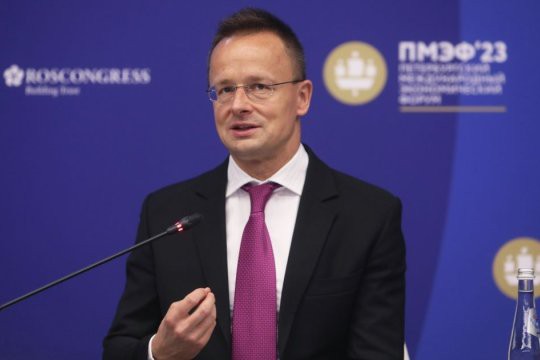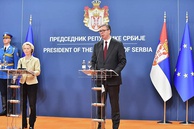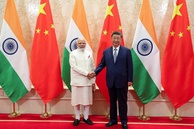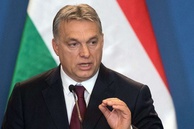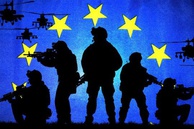During a visit to St. Petersburg, Hungarian Foreign Minister Péter Szijjártó attended the St. Petersburg Economic Forum and took part in the session "Energy of the 21st Century: Challenges of the Present - Opportunities of the Future."
During the trip, Hungary’s top diplomat heaped praise on the development of bilateral relations during the past few years, noting that during that period, “Moscow and Budapest managed to create several success stories, when normal cooperation was still possible.” Unfortunately, the current geopolitical realities have narrowed the areas where the two countries can develop economic ties. The EU has introduced ten packages of sanctions against Russia, but has been unable to agree the next, eleventh, package for more than a month now. And one reason for this failure is the position of Hungary.
Almost from the very outset of the escalation of the Ukrainian conflict, Hungarian Prime Minister Viktor Orban has been saying that the EU’s radically anti-Russian stance would only exacerbate the problems caused by rising inflation and the energy crisis. Late last summer, Orban stated "that the West failed to weaken Russia, help Ukraine win the military confrontation, and also get the support of the whole world >…< a new strategy is needed to focus on negotiating peace and preparing an acceptable peace accord, and not on winning on the battlefield."
Hungary’s realistic assessment of the events of the past eighteen month allows it to take a balanced approach to the retaliatory measures that Moscow is taking against Western countries. Before leaving for St. Petersburg, Péter Szijjártó traveled to New York to attend a meeting of the UN Security Council. Answering questions from the US television channel Newsmax, the Hungarian foreign minister noted that Budapest understands the motives of Russia, which included Hungary in the list of "unfriendly states." "We're not surprised." “Hungary is a member of NATO and the European Union, and all such states were included [by Russia] in this category,” Szijjártó explained. [i]
In its relations with Moscow, Budapest’s pragmatic approach is to focus on areas of cooperation where the EU preferred, perhaps only temporarily, not to impose sanctions against Russia. The main such areas are energy, medicine, the pharmaceutical industry and agriculture. Ahead of his trip to Russia, Szijjártó noted that the main purpose of his participation in SPIEF was “to discuss the issues of this country's energy supply.” "Hungary's energy supply is not a political or ideological issue, because heating is still only possible with gas." Hungary buys significant volumes of natural gas from the Russian Federation, which, unlike a number of other EU countries, ensures a stable operation of such energy-intensive sectors as the production of mineral fertilizers, food and chemical industries.
In 2021, Hungary signed new long-term contracts with Russia’s Gazprom. According to each contract, the annual volume of supplies, planned for 15 years, was set at 4.5 billion cubic meters. Of this, 3.5 billion cubic meters go through the Balkan Stream gas pipeline via Serbia, where gas comes from the Turkish Stream, and another one billion - through Austria. Hungary started getting the first deliveries along the Balkan route on October 1 of that same year.
True to its pragmatic approach, in the spring of 2022, Budapest adopted the Russian scheme, which provided for payment for gas supplies in rubles. Unlike most of their EU colleagues, the Hungarian authorities have demonstrated their full understanding of the complexities of European energy geopolitics. Firmly determined to stand up for its national interests, Hungary managed to secure permission from Brussels to bypass the sanctions regime and continue to import Russian oil via the Druzhba pipeline. Towards the end of the summer of 2021, Russia agreed to ramp up gas supplies to Hungary in excess of the contractual volumes agreed in 2021. Péter Szijjártó signed an additional agreement with Gazprom to increase Russian gas supplies to Hungary by 5.8 million cubic meters daily.
In April of this year, he came to Moscow and the negotiations he had there with Russian Deputy Prime Minister Alexander Novak brought good news for Hungarian consumers. According to a TASS report, Gazprom announced an extension of the agreement on the supply of additional volumes of gas. In addition, the Russian gas giant said it was ready to grant Budapest a deferment in payments for imported Russian fuel. In his turn, the Hungarian minister said that his country would be able to receive "deferred payments above a certain limit in the event of extreme price hikes" for gas. He also received assurances from Moscow "of the security and stability of supplies via the Turkish Stream gas pipeline." Finally, they agreed on payment for oil transit for Hungary via Ukrainian territory directly by the Hungarian oil and gas company MOL. In 2022, Hungary received 4.9 million tons of oil from Russia.
A contract for the construction of two new power units at the Paks nuclear power plant is another major Russian-Hungarian energy project. In 2014, the two countries signed an agreement providing for the construction of two 1,200 MW reactors at the cost of 2.5 billion euros. According to the newspaper Kommersant, Moscow agreed to allocate 10 billion euros in loans. This spring, following Szijjártó's talks in Moscow, the Russian and Hungarian sides agreed to change the terms of the contract.
Although the details of the new agreement are not yet known, construction is clearly gaining momentum. Late in April, the newspaper Le Monde reported that the French Ministry of Energy Transition had granted domestic companies permission to participate in the project together with the Russian concern Rosatom. At the end of May, Péter Szijjártó, who, in addition to foreign policy, also deals in issues pertaining to foreign trade, announced that the European Union had issued a permit to Rosatom to complete the construction of Paks-2. As a result, according to the Hungarian minister, the second stage of the nuclear power plant is set to go online "in the early 30s."
Victor Orban’s firm commitment to prioritizing Hungary’s national interests has invited harsh criticism from the media and the political establishment of the vast majority of the other NATO and EU countries. In London, The Economist notes that Budapest largely shares the Russian view that the supply of Western military aid to Ukraine only exacerbates the conflict, causing great damage to Europe. At the end of May, Viktor Orban noted again that the West "... has no chance of winning this war." In addition, according to Western critics, Hungary's position "plays into the hands of Moscow's foreign policy interests." As an EU member, Hungary, which has veto power over foreign and security policy, has used it to slow down or at least soften EU initiatives against Moscow. As a member of NATO, Hungary counteracts the escalation of the Ukrainian conflict, trying to block military assistance to Kyiv. Besides, Budapest still refuses to greenlight Sweden’s accession to NATO.
In March of this year, the Hungarian prime minister seemed to start bending under the growing political pressure. During a public appearance, Orban said that Budapest “needs to think carefully about future relations with Russia." At the same time, however, he showed a deep understanding of the changes that are taking place in the European geo-economy under the impact of the Ukrainian conflict. The Hungarian prime minister pointed to Europe's increased economic vulnerability after it succumbed to Washington's calls to break off economic ties with Moscow as soon as possible. Orban made it clear that this division will not benefit the EU. “If the US tries to disconnect the European economy from the Chinese economy, even the German economy would suffer," he added. Orban warned that under such dangerous circumstances "...Hungarian foreign and economic policy should consider ways to establish and maintain relations with Russia over the next 10-15 years." [ii]
Despite all this pressure, relations between Russia and Hungary remain steady on course. During his visit to St. Petersburg, Péter Szijjártó held talks with Russia’s Deputy Prime Minister and Minister of Industry and Trade Denis Manturov. The two discussed not only the continuation of cooperation in the energy sector, but also in other economic sectors not yet subject to Western sanctions. Szijjártó once again underscored the fact that supplies from Russia guarantee the energy security of his country. He also met with Russian Health Minister Mikhail Murashko, voicing a sincere hope for continued fruitful cooperation between the two countries.
In 1999, having barely joined NATO, Hungary criticized the alliance's operation in the Balkans. It was during Victor Orban’s first term as prime minister. Today, Hungary's position remains flexible and realistic, in line with the policy laid out back in the late 1990s: "This is not our war; Hungary must remain out of it." Viktor Orban and his supporters have invariably stuck to this notion since the very start of the escalation of the conflict in Ukraine. According to the Hungarian leader, “... humanitarian support to Ukraine does not mean the end of our relations with Russia, because this would run contrary to our national interests, which we have the right to determine ourselves. This is why we will not agree to sanctions against the gas, oil or nuclear industry that will destroy Hungary… This is why we maintain our economic relations with Russia, and we even advise the entire Western world to do so, because without relations there will be no ceasefire, no peace talks. [iii]
The Hungarian foreign minister’s appearance in St. Petersburg is an open challenge to the policy of the EU and NATO, which seek to present the Russian Federation as a “rogue state.” Budapest thus shows that even in Europe there are still realistically-minded political forces that do not support this line of thinking.
The views of the author are his own and may differ from the position of the Editorial Board.
[i] https://eadaily.com/ru/news/2023/06/14/v-vengrii-razyasnili-pochemu-rossiya-vklyuchila-stranu-v-nedruzhestvennyy-spisok
[ii] https://www.mk.ru/politics/2023/03/10/proyasnilsya-smysl-zhestkikh-slov-orbana-ob-otnosheniyakh-vengrii-s-rossiey.html
[iii] http://vestnikieran.instituteofeurope.ru/images/1-2023/Shishelina12023.pdf
read more in our Telegram-channel https://t.me/The_International_Affairs

 12:17 21.06.2023 •
12:17 21.06.2023 •
